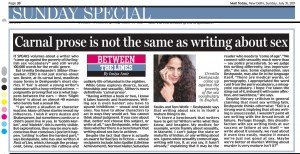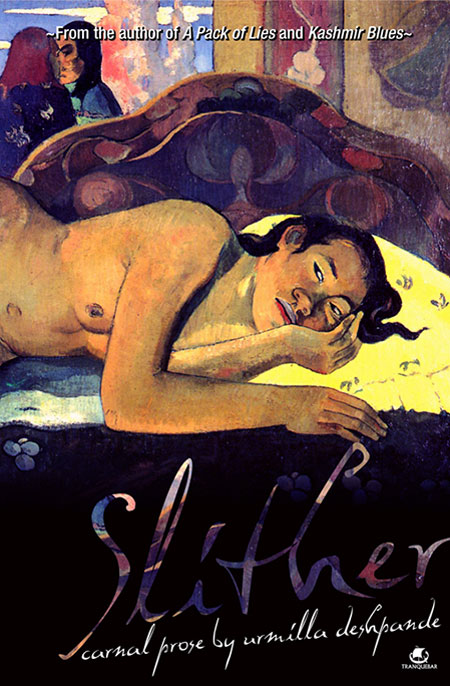 Mail Today, New Delhi, Sunday, July 31, 2011: Between the Lines by Insiya Amir
Mail Today, New Delhi, Sunday, July 31, 2011: Between the Lines by Insiya Amir
Carnal prose is not the same as writing about sex
IT SPEAKS volumes about a writer who “came up against the poverty of the English sex vocabulary” and still wrote 100,000 words for the erotic genre. But Urmilla Deshpande’s Slither (Tranquebar, Rs.250) is not just stories about sex. Desire, at its carnal best, manifests many forms in Deshpande’s short stories. If ‘Isis’ is about a young writer’s obsession with a long-retired actress — poignantly proving that sex is what happens between the ears — then ‘Slight Return’ is about an almost-40 woman who barely had a sexual life. “I go where a situation or character lead me. Many of these stories reveal my influences. I wish it were Austen and Shakespeare, but sometimes comics or a child’s poem live in you. In ‘Goblin Market’, and ‘Malekh’, this is overtly visible. But explorations, they may be more subconscious than conscious. I just let it happen. ‘Letting’ is often the hardest part,” says Deshpande, who has also written A Pack of Lies, which, through the protagonist, Ginny, examines the ruthless and unlikely life of Mumbai in the eighties. While Ginny explores divorce, incest, friendship and sexuality, Slither is more definitively ‘carnal prose’. “Having written a book or two, I know it takes honesty and fearlessness. Writing sex is even harder: you have to squash inhibitions — sexual and social ones. You have to allow characters to act in ways they would act. You cannot think about judgment. If you care about that, better not choose this subject, or write at all,” says Deshpande, who questions whether there is a benchmark that writing about sex has to achieve.
Despite the fact that there is actually an award for Bad Sex in Fiction — whose recipients include John Updike (Lifetime Achievement), Norman Mailer, Sebastian Faulks and Tom Wolfe — Deshpande says that writing about sex is in itself a mature thing to do. “Is there a benchmark that writers have to get to? Writers write what they know, and imagine. My mother, for example, wrote frankly about sexuality, in Marathi. I can’t judge the state or maturity of Indian, or any writing about sex. I guess when sexuality comes of age, writing will too, if, as you say, it hasn’t already,” explaining that it may be the reader who needs to ‘come of age’. “We connect with sexuality much more than— say police procedurals. So we judge this writing differently, less impersonally,” she says. Some explanation, says Deshpande, may also lie in the language itself. “There are medical words, or pornography. I appropriated the word cunt from the porn vocabulary, a misogynist vocabulary. I hope I’ve taken the sting out of it, imbued it with some affection, and sweetness,” she says.
Despite literary criticism in general claiming that most sex writing fails, Deshpande thinks otherwise: “Fail is a strong word, implying that all sex writing is unsuccessful. I wouldn’t paint all sex writing with the broad brush of failure. Perhaps though, this dissatisfaction with sex writing hints at our success or failure at sex itself — we write about it uneasily, we read about it even less easily, maybe it means we’re just not good at sex. Maybe we’re better at murder. Writing about murder is very mature isn’t it?”




 Mail Today, New Delhi, Sunday, July 31, 2011: Between the Lines by Insiya Amir
Mail Today, New Delhi, Sunday, July 31, 2011: Between the Lines by Insiya Amir